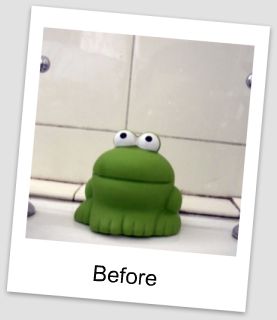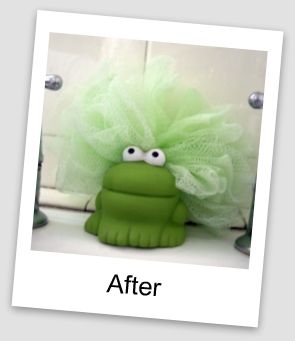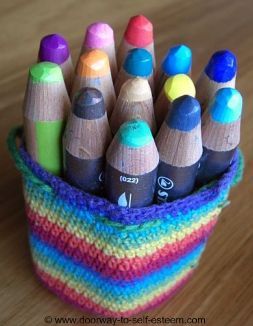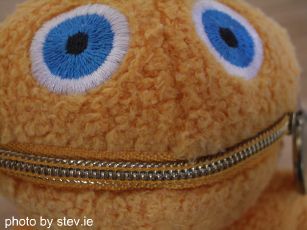Self Esteem & Creativity
by May Bleeker, 4 June 2009
Self esteem and creativity are two of my favourite subjects. But what do they have in common? As it happens, a few interesting things!
Lets Not Dissect the Frog
 |
 |
Analyzing humor is like dissecting a frog. Few people are interested and the frog dies of it. - E.B. White
There are some subjects, like humour and creativity, that don't lend themselves well to methodical analysis.
There's that quality of funny that becomes very unfunny and boring very very quickly when you try to break it down into parts. (I hope that doesn't happen here!).
Its the same with creativity. As soon as you start looking for the 'building blocks' or the 'fundamentals' it all seems to lose its sparkle and appeal and you start feeling that the conversation is really about something that is completely the opposite of creativity.
So I want to write about self esteem and creativity and the connections between them, but I don't want to dissect the frogs. At least, I'll try not to.
But lets look at the frogs. Lets watch them leap. Lets see what colors they are, what they do and how they interact (I mean creativity and self esteem, of course - frogs are just an analogy :)
Feel free to browse to the parts that interest you.

The Role of Self Acceptance
Being creative involves an attitude of receptivity and self acceptance.
Whenever you give rise to a thought, almost straight after, an element of judgment sometimes comes in. 'Good' or 'bad', 'right' or 'wrong', 'nice' or 'horrible'.
Sometimes this process is so quick you don't even notice the space between the thought that comes up and the judgments that follow. You might not even be aware of the thoughts themselves.
For some people, this element of judgment, especially when unnoticed, can stifle expression. Ideas are stillborn. Projects never get further than a spark that is snuffed by their inner critic.
Judgment vs Sensing
Creating a poem, a picture, an object, a song, or any other creative effort involves suspending this element of judgment long enough for the 'creation' to come into being. If judgments are made too soon the work is derailed, or blocked or becomes stilted and 'forced'.
Not to say that there isn't any judgment involved in the creating, just that, in my opinion, it is more accurate to call it 'feelment' than judgment (even though there is no such word - I exercise my creative right to make one up!).
I will try to explain what I mean. Your mind has a way of evaluating things. Lets call this the judging mind. It is not this part of your mind that allows the creative to come through - at least, not for me. The judging part comes afterwards.
Your mind also has a way of sensing things. Picking up information and being receptive to information from outside and simultaneously information from inside. Lets call this the feeling mind. There are no judgments here, yet. Just sensations, vague knowings, feelings and things-in-the-corner-of-your-vision-dont-chase-them-away.
It is this open, welcoming 'sensing' mind that follows a subtle guidance - allowing something to emerge through the instruments at your disposable. Your instruments are sound, form, light, colour, sensation, your eyes, your ears, your sense of touch, your hands, your voice, your mind, whatever is to hand, that allows the idea or form or whatever, to come through into the world.
In being creative, not only do you have to be receptive to information from outside and inside (at the same time), you also have to be accepting of yourself.
For creative expression to happen you have to let yourself be. You have to allow yourself to play on that page, write what comes up, work in a way that feels right. You have to be able to let that thought be there, look at it, see where it leads.
You have to be able to start without a plan, or if you start with one, to throw it away inbetween.
If your every thought is negative and self-squashing...what is there available to be expressed? You'll never know while its all tied up and pressed down and not allowed out to play.
Duct Tape for the Inner Critic
Creative people who are blocked and not 'practicing their art' often have a strong inner critic. Some are not even aware of it, all they know is that they break out into a cold sweat when faced with the blank page (or the lump of clay / the storyboard / the blank computer screen / canvas / etc).

Releasing creative blocks involves identifying and silencing this critic. Learning to work around it, through it or under it - but above all, despite it.
The Artist's Way by Julia Cameron has beautiful examples of how creative people have overcome their barriers through identifying the critical 'voices from their past' that might still be in their heads, affecting their feelings and actions.
One of the key things is that while they were working on this, they did not stop creating (writing, painting, crafting, composing, knitting, baking, sewing). They had to work through it, not wait until things were perfect before starting.
Enjoying high self esteem also involves silencing the critic. There is nothing wrong with healthy self-evaluation, but habitual, repetitive self criticism stifles self esteem as surely as it stifles creativity.
There, thats the first connection (froggy leap).
#1 Just as creativity involves 'letting yourself be', so does having self esteem.
Self esteem is your opinion of yourself. If you never let your self emerge with any spontaneity, there can be no genuine acceptance of yourself. Or put the other way, without genuine acceptance of yourself, you can't spontaneously and naturally express yourself.
So self esteem and self expression (creativity) go hand in hand with self acceptance.
Yes, you have faults and you will not escape them. No need to! Get acquainted with your flaws! This is a very good way of influencing them for the better! Get close to them. Figure them out. Work with them. Be who you are and your self esteem grows, even if the flaws stand out more. We are all human, afterall.
Just bear in mind the motto: Be kind. And do no harm.
That goes for other people as well as yourself.
People with high self esteem know when to give themselves a break. Creative people love breaks too :)
Problem-solving
Some would say that life is all about solving a series of problems. Need food and shelter? Solve the problem by finding a job to pay for them or figure out how to build a house and grow food for yourself (lots of problems to solve there!).
Need love in your life? Solve the problem by meeting people and making friends until you find the one you love. Or solve the problems of being a loving person and let someone find you...and so on.
Feeling able to solve problems for yourself is a very big part of high self esteem.
People with high self esteem have a sense of mastery over themselves and their lives. This is based, at least in part, on the ability to successfully adapt their thinking and actions to situations. It is based on being able to cope with, work around, work through and accept the problems that arise in everyday living.
It doesn't mean they feel like superman all the time, just that when those troubles arise they just know that they will find a way to work through them. Having high self esteem doesn't even mean feeling in control when things go wrong. It means having the mindset that allows you to give yourself the best chance of making it through.
Self esteem helps you solve the problems that are within your power to solve, and helps you avoid creating new ones in the process. This ability to respond appropriately to a situation is a very basic part of positive self esteem.
What does creativity help you do?
You guessed it.
Connection number two (froggy leaps twice):
#2 Self esteem, like creativity, helps you solve problems.

What are you gonna do? Not go out sailing in case you capsize?
Creativity, by nature, is the very thing that allows you to adapt your thinking and behaviour.
It allows you to see things from different angles and to use information in new, unusual and unexpected ways. This is of tremendous benefit when solving problems of any kind.
In fact, I believe that every problem-solving effort involves an element of creativity. And I'm in good company.
The true sign of intelligence is not knowledge but imagination. - Albert Einstein
Of course, you can't exclude the role that logic and reason play. Obviously these form part of a successful problem-solving process. But logic and reason alone never brought anything new into the world.
No one ever made a great discovery without the exercise of the imagination. - George Henry Lewes
Self esteem and creativity are both close cousins to successfuly problem-solving.
Tolerating Failure
People with high self esteem tend to persevere in the face of difficulty. Managers with high self esteem were found to persevere with trying to solve a problem on average 3 times as long as their low self esteem colleagues. 'Failures' are seen as just steps along the way that didn't fit the need of the situation.
Persevering and accepting 'failure' as part of the process allows you to stay open for when the more effective solution arises. It allows you to continue until you find it. Often, the difference between success and failure is simply how long you continued to work at it vs how quickly you give up.
Where you fear failure - your self esteem suffers. You avoid experiences that can teach you something real about situations, people and life.
In being creative you have to be able to tolerate failure in the same way. You don't judge something to be 'wrong' or 'right' too soon. You don't give up on your creation in the middle, when it doesn't look like anything. You have the faith to keep at it, even though other people can't 'see it' and therefore don't support it. You don't need validation from outside to keep on going, because you know that even when it looks like its not working, something is happening, and that something is part of what your creation is going to be.
The creative process is a continuous experiment, adapting and generating until you hit the 'sweet spot'. When you are happy with the result - this is your success. Not what other people say or do.
Connection number three (froggy leaps thrice)
#3 Self esteem and creativity both rely on the ability to tolerate 'failure' or even see 'failures' as merely curves in the path.
Just part of the process, a sign of progress, not something shameful or bad, not a reason to give up.
In fact, sometimes the best things come out of the unpredictable 'mistakes' that occur along the way, if you can let those 'mistakes' hang around long enough for the benefits to become visible.
There's more, but I don't want to bore you.
Just one last thing:
How do creativity and self esteem differ?
I've spotted one way.
Those with high self esteem are usually able to manage (tolerate, accept and work with) their emotions quite well. Feelings can fluctuate as much as the weather, and in fact, research even shows that feelings are often influenced by the weather! We just sometimes incorrectly assume these fluctuations in mood are due to things happening in our lives.
People with positive self esteem usually have ways of coping with their feelings that allow them to get on with life.
No matter whether the feeling is positive or negative it is not allowed to rule to such an extent that it prevents you from acting in a way that is good for you and others. Feelings have their proper place. Feel them and acknowledge them and then get on with things!
When you are less able to manage your emotions you might find that your actions are strongly influenced by them. Your emotions end up driving your actions instead of you.
You retaliate when it would be better to not act. You blurt things out that are better left unsaid, or you fail to act when you need to, because of fear or other emotions.
In cases like this you feel incapable of acting in any other way, even when other choices exist. Being able to manage your emotions (work with them, not suppress them) gives you the choice of how to act. It helps make sure your feelings don't override your judgement and reason.
Being creative is no guarantee that you will have this ability to manage (tolerate, accept and work with) your emotions. In fact, lots of evidence suggests that very creative people often have even less ability to manage their emotions than their more rational, logical counterparts. I have my own theory about this and will write it up in: Emotions and creativity (hopefully this year still!)
I'd like to keep my ear
But I believe your creativity shouldn't take precedence over your life. If you are able to create great works of art, but your life is a shambles and ends prematurely - well, I do not wish this for myself. You may differ from me here! Feel free to use the comments page :)
I would rather want the ability to create to my fullest capacity, enjoying all aspects of life equally and generally having a good life, than be shooting star, painting incredible, tortured paintings, cutting off my own ear, living lonely, suffering and dying before my time, bitterly impoverished.
I don't judge anyone who has had a life like this, in fact, I thank them for the beautiful legacy they left behind despite (or because of) their pain. Probably there was not a lot of choice in the matter, or would they have chosen this? Who knows the extent to which we are actually able to choose? Sometimes it seems fairly limited.
In some cases creative people may give themselves permission to 'be an emotional mess' because they think this is part of being creative. It isn't necessarily. It is just a part of being human.
In other cases, experiencing emotional extremes can sometimes give rise to creativity as an outlet. Like the whistle on a pressure-cooker, creativity can let off emotional steam.
Managing your emotions better does not reduce creativity (or even depth of feeling). In fact, in my instance I think that being stronger in this way has given me a greater capacity to feel certain things more deeply than I was able to before. My emotional 'grab bag' is bigger, tougher and more able to hold my emotions while I feel them, think about them and recognize them. There is less running from emotions and more compassion for myself.
Before, there may have been feelings that scared me or threatened to overwhelm me. I avoided these by avoiding certain situations, people and things. I put a lid on myself at times and blanked off what I couldn't cope with.
Being able to manage this side of myself better gives me more options. I can tolerate more and allow more in. It allows me more freedom of choice in how I respond. This has had a positive impact on my creative expression.
Of course, this is all my humble opinion.
I would love to hear about any other similarities (or differences) you might see and experience, between creativity and self esteem. Please contact me with your ideas and we'll swap notes.
Return from Self Esteem and Creativity to Home Page




New! Comments
Your feedback is welcome: